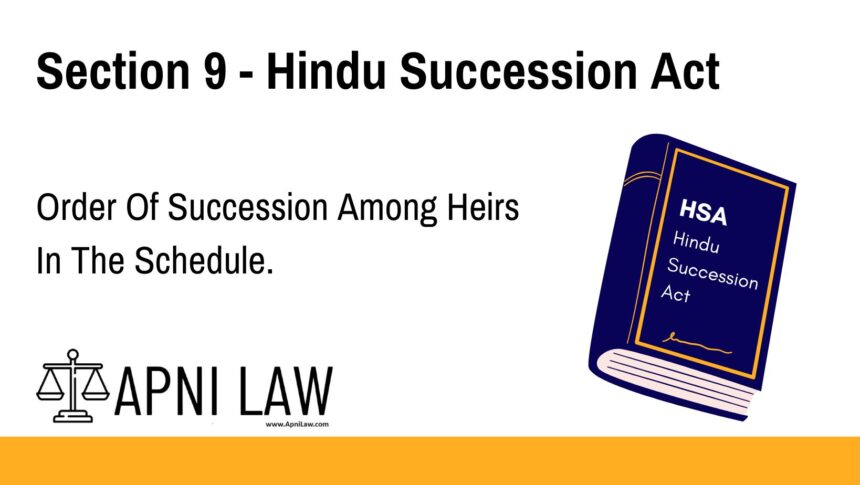Code: Section 9 – Hindu Succession Act
9. Among the heirs specified in the Schedule, those in Class I shall take simultaneously and to the exclusion of all other heirs; those in the first entry in Class II shall be preferred to those in the second entry; those in the second entry shall be preferred to those in the third entry; and so on in succession.
Explanation of Section 9 – Hindu Succession Act
Section 9 of the Hindu Succession Act provides the rules governing the order of succession among heirs listed in the Schedule to the Act. The section clarifies how property is to be distributed among heirs based on their class and entry within that class. The key points of this section are:
- Class I Heirs: The Class I heirs will inherit the property simultaneously, and to the exclusion of all other heirs. This means that if there are any Class I heirs, they will inherit the property over all other classes.
- Class II Heirs: If there are no Class I heirs, the property will devolve to the heirs specified in Class II. However, within Class II, the succession follows a specific order:
- The heirs in the first entry of Class II will be preferred to those in the second entry.
- Similarly, the heirs in the second entry will be preferred to those in the third entry, and so on.
This structured order ensures that property is passed down in a systematic manner based on the proximity of the heirs to the deceased.
Illustration
Example 1: Class I Heirs
A male Hindu dies intestate. His Class I heirs (wife, children, and mother) are present. According to Section 9, these heirs will inherit the property simultaneously and to the exclusion of any Class II heirs.
Example 2: Class II Heirs
If there are no Class I heirs, but there are Class II heirs (e.g., siblings, nieces, nephews), the property will go to those in the first entry of Class II before going to the second entry heirs.
Example 3: Succession Among Class II Heirs
In a case where only Class II heirs exist, the first entry heirs (e.g., father, mother, brothers, sisters) will inherit first. If no one from the first entry is available, then the inheritance will pass to those in the second entry (e.g., aunts, uncles, cousins), and so on.
Common Questions and Answers on Section 9 – Hindu Succession Act
1. What happens if there are both Class I and Class II heirs?
- Answer: If there are any Class I heirs, they will inherit the property first and to the exclusion of all Class II heirs, regardless of their position in the class.
2. How is the succession ordered within Class II heirs?
- Answer: Within Class II, the heirs are ordered in a sequence. The heirs in the first entry take precedence over those in the second entry, and the second entry heirs take precedence over those in the third entry, and so on.
3. Does the order of succession apply to all property types?
- Answer: Yes, the order of succession defined in Section 9 applies to the devolution of all property, both movable and immovable, of a Hindu male who dies intestate.
Conclusion
Section 9 of the Hindu Succession Act ensures a clear and structured order for the devolution of property. Class I heirs inherit first, and within Class II, the heirs are further prioritized based on their position in the schedule. This hierarchy ensures fairness and clarity in the distribution of property.








